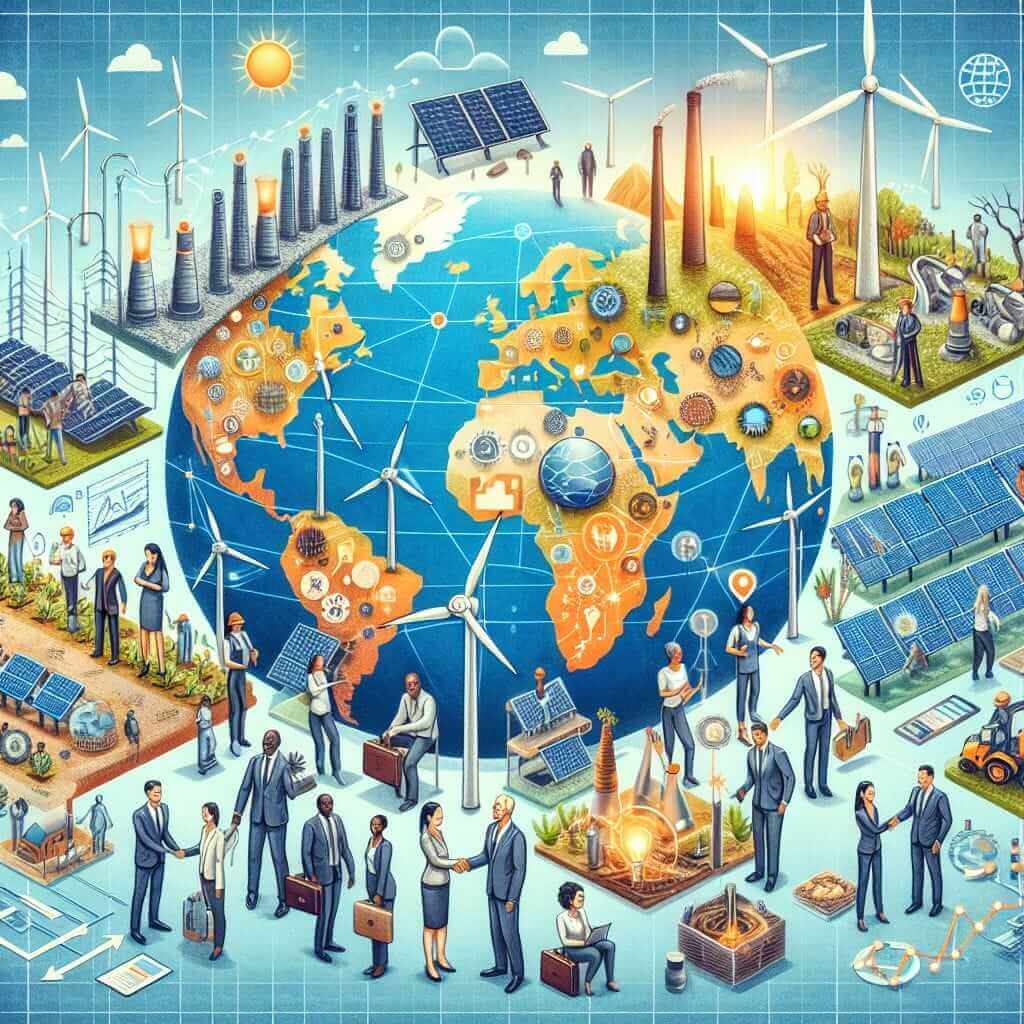The IELTS Reading section is designed to assess your reading skills in English, including your ability to understand detailed texts, identify specific information, recognize writers’ viewpoints, and comprehend general ideas. Topics often reflect various current issues, and one such trending subject is the “Impact of Renewable Energy on International Relations”. This theme has gained prominence recently due to global shifts toward sustainable energy.
Considering its relevance and increasing appearance in similar forms in past IELTS exams, we might expect this topic to show up in future tests as well. In this guide, you’ll get a detailed IELTS Reading practice exercise that simulates a real exam scenario.
Reading Passage and Questions
Reading Passage
Impact of Renewable Energy on International Relations
In recent years, the shift from fossil fuels to renewable energy sources has significantly impacted international relations. Renewable energy, primarily derived from solar, wind, hydropower, and geothermal sources, is not only critical in mitigating climate change but also in altering geopolitical dynamics.
Historically, fossil fuel resources, such as oil and natural gas, have been concentrated in specific regions, leading to unequal power distribution globally. Countries rich in these resources gained economic and political leverage over others. However, renewable energy sources are more evenly distributed, which can potentially democratize access to energy and diminish the strategic importance of traditional oil-rich nations.
One aspect of this transition is the technology and knowledge transfer necessary to develop and maintain renewable energy infrastructure. Countries with advanced renewable technologies, such as Germany and China, are spearheading initiatives to export their technologies globally. This has led to new alliances and partnerships, as nations collaborate on green projects that promise a sustainable future.
Furthermore, the competition for renewable energy technology dominance has intensified. China, for example, has aggressively pursued a leading role in solar panel production, while the U.S. and European Union are investing heavily in research and development of next-generation batteries and smart grid technologies.
However, the transition is not without challenges. Emerging economies, heavily reliant on fossil fuel exports for revenue, face economic uncertainty. The shift might also incite geopolitical tensions as traditional energy powers strive to maintain their influence.
In conclusion, while renewable energy promises numerous environmental and socioeconomic benefits, it also requires careful navigation of international relations. The balance of power is shifting, and how countries adapt to this change will determine future global alliances and conflicts.
Questions
Multiple Choice
-
What is the primary reason renewable energy impacts international relations?
A. It decreases global warming.
B. It changes the geopolitics of energy distribution.
C. It is cheaper than fossil fuels.
D. It creates more jobs. -
Which country is mentioned as a leader in exporting renewable energy technology?
A. United States
B. China
C. Germany
D. Both B and C
Identifying Information (True/False/Not Given)
- Emerging economies are unaffected by the shift to renewable energy. (True/False/Not Given)
- Solar panels are mainly produced in Europe. (True/False/Not Given)
- Renewable energy sources are less evenly distributed than fossil fuels. (True/False/Not Given)
Matching Information
Match the following aspects with the corresponding countries:
A. Leading in solar panel production
B. Heavy investment in next-generation batteries
- China -> _____
- United States -> _____
Summary Completion
Complete the summary using words from the passage.
Historically, fossil fuels led to unequal _ (8), but renewable energy promises more __ (9) access. Countries like __ (10) and China export advanced ___ (11) technologies.
Answer Key
-
B – It changes the geopolitics of energy distribution.
-
D – Both B and C
-
False – Emerging economies face economic uncertainty due to the shift.
-
Not Given – The passage mentions China’s leadership in solar panels but doesn’t specify about Europe.
-
False – Renewable energy sources are more evenly distributed.
-
China -> A
-
United States -> B
-
power distribution
-
democratized
-
Germany
-
renewable
Lessons
Common mistakes in tackling such reading passages include misinterpreting data, overlooking keywords, and making assumptions not supported by the text. Focus on reading each question carefully and identifying the precise information needed.
Vocabulary
- Geopolitical (adj): Relating to politics influenced by geographical factors.
- Mitigating (verb): Making something less severe.
- Infrastructure (noun): The basic physical systems and structures needed for the operation of a society or enterprise.
- Emerging economies (noun): Nations with social or business activities in the process of rapid growth and industrialization.
Grammar Focus
- Relative Clauses: “Countries with advanced renewable technologies, such as Germany and China, are spearheading initiatives…”
- Structure: Main clause + relative clause (who/which/that)
- Example: “The man who works here is very friendly.”
Tips for High Reading Scores
- Practice regularly with IELTS reading materials.
- Focus on understanding the test format and various question types.
- Improve vocabulary related to common IELTS topics.
- Develop skills to scan and skim texts effectively.
- Time your practice sessions to build speed and accuracy.
To explore more about challenges and impacts related to renewable energy, you might find the following articles interesting:
- Challenges in Achieving Energy Independence
- Impact of Renewable Energy on Global Economic Policies
- Impact of Renewable Energy on Global Economic Stability
 Renewable Energy and Technology Transfer
Renewable Energy and Technology Transfer
In conclusion, while practicing, focus on understanding the context and improving your comprehension skills. Good luck with your IELTS preparation!


